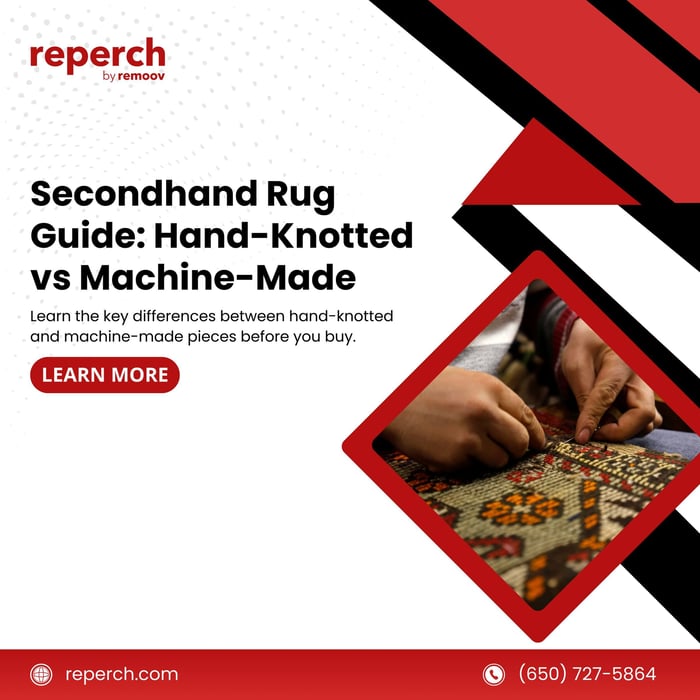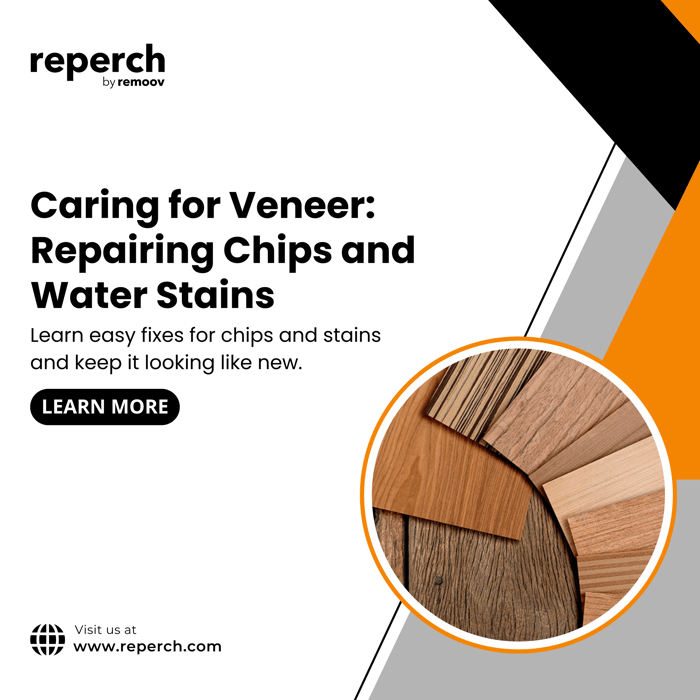Shopping for rugs can feel overwhelming, especially when you're browsing secondhand rugs. Hand-knotted? Machine-made? Tufted? Woven? The jargon alone is enough to make anyone give up and grab a bath mat instead.
But if you're shopping secondhand, understanding the differences between hand-knotted and machine-made rugs is the key to getting real value for your money. Whether you're furnishing your first apartment, redesigning your living room, or hunting for a vintage heirloom, this guide will help you shop smarter and more confidently.
Let’s explore the key differences, pros and cons, and how to spot each type when buying used.
What’s the Real Difference Between Hand-Knotted and Machine-Made Rugs?
Before we dig into inspection tips, here’s a quick overview of how each type is made:
Hand-Knotted Rugs
Made entirely by hand on a loom, knot by knot. Often takes months to complete a single rug. Crafted with natural materials like wool, silk, or cotton. Every piece is unique. Considered an heirloom item.
Machine-Made Rugs
Produced using automated looms. Can be finished in hours instead of months. Usually made with synthetic fibers like polyester, nylon, or acrylic. Consistent in pattern and size. Often more affordable and readily available.
So which one is better? It depends on your budget, lifestyle, and long-term goals.
Why Does This Matter for Secondhand Buyers?
When you’re shopping secondhand, it’s easy to be drawn in by aesthetics alone. But the materials, craftsmanship, and longevity of your rug will determine whether it’s a smart investment or a waste of cash.
A secondhand hand-knotted rug may cost more upfront than a used machine-made one, but it could last decades longer and retain its resale value.
Let’s break it down further.
Pros of Buying Hand-Knotted Rugs Secondhand
1. Timeless Quality
Hand-knotted rugs are built to last 20 to 100 years, even with regular use. When you buy one secondhand, you're likely getting a rug that still has plenty of life left.
2. Natural Materials
They’re often made from wool, silk, or cotton. These materials are durable, naturally stain-resistant, and easier to clean than synthetics.
3. One-of-a-Kind Design
No two hand-knotted rugs are exactly the same. Each one reflects the weaver’s unique style, making your piece truly special.
4. High Resale Value
If you take care of it, you may be able to resell a hand-knotted rug later, sometimes for even more than you paid.
5. Environmentally Friendly
Buying secondhand and choosing natural materials reduces waste, avoids plastic-based fibers, and keeps your décor more sustainable.
Things to Watch Out for with Hand-Knotted Rugs
Look out for repairs, unraveling edges, major discoloration, or signs of water damage. Machine-made rugs can mimic the look of hand-knotted ones, so always inspect the back. And be mindful that these rugs can be heavy. Ask about pickup or delivery options.
Pros of Buying Machine-Made Rugs Secondhand
1. Budget-Friendly
If you're furnishing on a tight budget, a secondhand machine-made rug is usually your cheapest option.
2. Low Commitment
Great for rentals, dorms, or temporary spaces. No need to stress over minor spills or damage.
3. Modern Styles
Machine-made rugs often follow current design trends like geometric prints, abstract textures, or minimalist palettes.
4. Easy to Find
They're more common in resale shops, online marketplaces, and liquidation stores, giving you more variety to choose from.
Drawbacks of Secondhand Machine-Made Rugs
Most start to show wear within 5 to 8 years of use. Synthetic fibers can trap odors and be harder to clean. These rugs typically have no resale value and are not biodegradable, which adds to environmental impact.
How to Tell the Difference When Shopping
Here are a few tips to help you tell whether a rug is hand-knotted or machine-made, especially when buying secondhand:
1. Flip It Over
Hand-knotted rugs have a back that mirrors the front, with visible knots. Machine-made rugs have a mesh or cloth backing and flat patterns.
2. Look for Imperfections
Slight inconsistencies in design or color indicate a handmade rug. Machine-made rugs are perfectly symmetrical.
3. Check the Fringe
In hand-knotted rugs, the fringe is part of the rug’s foundation. In machine-made rugs, the fringe is sewn on afterward.
4. Ask About the Material
Wool and silk typically indicate handmade construction. Polyester, nylon, and acrylic are synthetic indicators of machine production.
5. Run a Hand Test
Hand-knotted rugs have a thick, luxurious feel and bounce underfoot. Machine-made rugs feel flat or plasticky.
Where Should Each Type Be Used?
Here’s a quick guide to where each rug type makes the most sense:
Room Type | Best Rug Type | Why |
Living Room | Hand-Knotted | High traffic and long-term use |
Bedroom | Hand-Knotted | Soft underfoot and elegant style |
Kids’ Room | Machine-Made | Affordable and easy to replace |
Rental Apartment | Machine-Made | Temporary and stylish |
Dining Room | Either | Depends on use and budget |
Entryway | Hand-Knotted | Durable wool hides dirt and wears well |
Price Comparison: What to Expect Secondhand
Rug Type | Size | New Price | Expected Used Price |
Hand-Knotted | 5x8 ft | 1,000 to 3,000 | 250 to 800 |
Machine-Made | 5x8 ft | 100 to 300 | 30 to 100 |
You can often get a gently used hand-knotted rug for the price of a brand-new machine-made one. The trade-off is upfront effort. You’ll need to inspect carefully and act quickly when you find a deal.
Final Thoughts: Which One Should You Choose?
If you want something timeless, beautiful, and built to last, a secondhand hand-knotted rug is your best bet. It may cost more, but it brings warmth, history, and craftsmanship into your space.
If you need something temporary, on-trend, or kid-proof, a secondhand machine-made rug will do the trick. It’s easy, affordable, and gets the job done.
But in the long run, handmade rugs tell stories. And if you’re shopping with intention, secondhand does not mean second best. It means smart, stylish, and sustainable.
Reperch Makes Rug Hunting Easier
At Reperch, we make it simple to find high-quality secondhand furniture and décor, including both machine-made and hand-knotted rugs. Whether you're shopping for budget-friendly basics or collector-worthy textiles, our listings are vetted for condition, authenticity, and design appeal.








